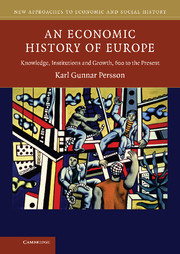Book contents
- Frontmatter
- Contents
- List of tables
- List of figures
- List of maps
- List of boxes
- Foreword
- Introduction: What is economic history?
- 1 The making of Europe
- 2 Europe from obscurity to economic recovery
- 3 Population, economic growth and resource constraints
- 4 The nature and extent of economic growth in the pre-industrial epoch
- 5 Institutions and growth
- 6 Knowledge, technology transfer and convergence
- 7 Money, credit and banking
- 8 Trade, tariffs and growth Karl Gunnar Persson and Paul Sharp
- 9 International monetary regimes in history by Karl Gunnar Persson and Paul Sharp
- 10 The era of political economy: from the minimal state to the Welfare State in the twentieth century
- 11 Inequality among and within nations: past, present, future
- 12 Globalization and its challenge to Europe
- Glossary by Karl Gunnar Persson and Marc P. B. Klemp
- Index
1 - The making of Europe
- Frontmatter
- Contents
- List of tables
- List of figures
- List of maps
- List of boxes
- Foreword
- Introduction: What is economic history?
- 1 The making of Europe
- 2 Europe from obscurity to economic recovery
- 3 Population, economic growth and resource constraints
- 4 The nature and extent of economic growth in the pre-industrial epoch
- 5 Institutions and growth
- 6 Knowledge, technology transfer and convergence
- 7 Money, credit and banking
- 8 Trade, tariffs and growth Karl Gunnar Persson and Paul Sharp
- 9 International monetary regimes in history by Karl Gunnar Persson and Paul Sharp
- 10 The era of political economy: from the minimal state to the Welfare State in the twentieth century
- 11 Inequality among and within nations: past, present, future
- 12 Globalization and its challenge to Europe
- Glossary by Karl Gunnar Persson and Marc P. B. Klemp
- Index
Summary
The geo-economic continuity of Europe
The formation of Europe was a long historical process which involved political, cultural and economic forces. The most striking fact is the geo-economic persistence and continuity of Europe during the last two millennia. We will deal with the integrative impact of trade as well as its border-maintaining effect in shaping and maintaining Europe. Trade was the cohesive force when political and military conflicts threatened to tear Europe apart.
If we let the core of Europe be defined by the borders of the European Union, we can trace back the origins of that geographical entity to the Roman and Carolingian empires, the latter emerging in the ninth century, several centuries after the collapse of the Roman Empire. (See Maps 1.1–1.3). About 80 per cent of the total population of the Roman Empire around the year 100 AD lived within the present (2010) borders of the European Union. It stretched from the Atlantic coast to the Black Sea. Ireland, the northern periphery of Europe, Scandinavia and Russia were touched by neither the Roman nor the Carolingian rulers. Russia's relationship to Europe has remained ambivalent throughout its history, with periods of self-imposed isolation as well as enthusiastic embracing of European ideals, and Scandinavia was late in joining the European Union; in fact Norway is still making up its mind whether to join or not.
- Type
- Chapter
- Information
- An Economic History of EuropeKnowledge, Institutions and Growth, 600 to the Present, pp. 10 - 20Publisher: Cambridge University PressPrint publication year: 2010

